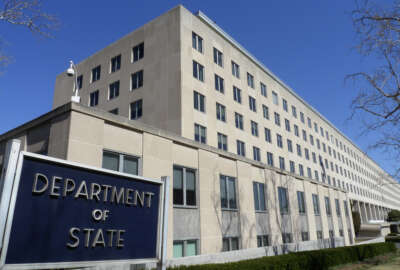
Hubbard Radio Washington DC, LLC. All rights reserved. This website is not intended for users located within the European Economic Area.
Hubbard Radio Washington DC, LLC. All rights reserved. This website is not intended for users located within the European Economic Area.
The State Department is launching two new fellowships meant to bring on a diverse next generation of hires into the ranks of its Civil Service and Diplomatic Se...
Best listening experience is on Chrome, Firefox or Safari. Subscribe to Federal Drive’s daily audio interviews on Apple Podcasts or PodcastOne.
The State Department is launching two new fellowships meant to bring on a diverse next generation of hires into the ranks of its Civil Service and Diplomatic Security Service.
Secretary of State Antony Blinken said Wednesday that the department will launch the Colin Powell Leadership Program, which will recruit college students and recent graduates to join the Civil Service.
Participants will join fellowships and internships that will lead to full-time employment at the State Department. The program will include training and mentoring to prepare them for their diplomatic work.
“If you don’t have a genuinely inclusive workplace, then people won’t stay. We’ve learned that, and we’ve learned that the hard way,” Blinken said at a ceremony marking the anniversaries of the department’s current fellowship programs.
The department will launch another fellowship meant to serve as a talent pipeline for the Diplomatic Security Service. The fellowship will be named after William D. Clark, Sr., the first Diplomatic Security member to achieve the rank of ambassador.
Fellows that complete the program will enter the Foreign Service as Diplomatic Security special agents.
Blinken said the new fellowships will help increase the diversity of the department workforce — a longstanding challenge documented for decades by the Government Accountability Office.
“For decades, American diplomats pretty much all looked the same. Many came from the same parts of the country, even the same schools. Just about everyone else — people of different genders, different faiths, different racial and ethnic backgrounds, nations of origin — they were relegated to supporting roles if they could find a place here at all,” Blinken said.
The department’s ceremony marked the 30th anniversary of the Thomas Pickering Fellowship, the 20th anniversary of the Charles Rangel Fellowship, the 10th anniversary of the USAID Donald Payne Fellowship and the fifth anniversary of the Foreign Affairs IT (FAIT) Fellowship.
Ambassador Marcia Bernicat, the director general of the Foreign Service and director of the Bureau of Global Talent Management, said these fellowships serve an “outsized role” in attracting diverse top talent into the Foreign Service.
“Diversity, in the broadest sense, is a critical comparative advantage for the United States on the world stage,” Bernicat said. “As we leverage that diversity as an institution, we are better able to understand and work with the world and are more effective at advancing our nation’s interests and serving the American people.”
Blinken said one in nine active Foreign Service officers participated in the Rangel or Pickering fellowships, and that the number of generalists from underrepresented backgrounds has increased by 33%. About 75% of Payne Fellows are racial or ethnic minorities and 75% are women. Approximately 65% of all FAIT fellows come from underrepresented backgrounds.
“These numbers represent progress,” Blinken said, “We still have a lot of work to do to create a department that truly reflects the people that we’re here to represent, that’s truly as diverse and inclusive as it needs to be if we’re going to fulfill our mission on behalf of this country and on behalf of its people.”
Blinken, soon after taking office, appointed former Ambassador to Malta Gina Abercrombie-Winstanley to serve as the department’s first chief diversity and inclusion officer.
The new position elevates a previous chief diversity officer role, and now reports directly to Blinken’s office. The department now has a much better data snapshot of its workforce diversity, as Abercrombie-Winstanley outlined as a priority in an interview last year.
“We have, for the first time ever, a remarkable data set, where we’ve disaggregated data, and we have a picture of virtually every single office in the department, where we are, where we’re not, where we need to go,” Blinken said.
The department also soon expects to publish its latest five-year strategic plan. Blinken said a draft of the plan is being reviewed by the White House, and reflects the feedback of nearly 1,000 Foreign Service officers and civil servants.
“Together, we’re looking at every single aspect of how we need to carry forward this agenda, from recruitment, which is vital, and particularly reaching out to communities that have been underrepresented here in high school, in college, opening hearts, opening minds to the idea that this could be a place where they want to spend their working lives,” Blinken said.
United States Agency for International Development Administrator Samantha Power said her agency last year increased the number of Payne fellows by 50%, and plans to double the numbers of fellows this year from 15 to 30.
“The road to public service is one that you have to carve out for yourself. That’s a difficult undertaking as all of us know, even when the odds are in your favor. So we need to continue to build up these programs and generate more exposure for a more diverse generation of future leaders in foreign policy development and diplomacy,” Powers said.
Powers said the agency is taking steps to elevate underrepresented voices.
“We have richer discussions, we make smarter decisions. We challenge one another, we try new approaches, and in the end, we see for sure better outcomes in the real world,” Powers said about the agency’s focus on diversifying its workforce.
USAID last year established the Office of Diversity, Equity, Inclusion and Accessibility, and expects to provide at least a quarter of all program funds directly to local partners by the end of fiscal year 2025.
Krina Patel, a USAID Foreign Service officer and one of the first alumna of the Payne Fellowship, said she tried applying for jobs at USAID prior to becoming a fellow, but “didn’t have any luck using the traditional means.”
“However, several years later, I applied for the Payne Fellowship, as I felt this agency could still benefit from my voice,” Patel said.
Patel now serves in the Office of the Administrator, where she supports the work of the USAID’s chief DEIA officer communicating why programs like Payne Fellowship “are essential to our work abroad.”
Patel said that outreach remains essential to recruit potential hires from underrepresented communities. Prior to her fellowship, she said it seemed U.S. foreign affairs agencies “honestly didn’t seem made for people like me.”
Melanie Randall, a member of the second cohort of the FAIT fellowship, said the program was a “godsend” to her and her daughter.
Randall, a single mother, worked as a pastry chef for several years, but lost her job and condo when her restaurant closed in 2008 because of the financial crisis. She enrolled at the University of Washington to earn her bachelor’s degree in IT, when she heard about the FAIT fellowship.
“When you’re accepted as a FAIT fellow, you become part of a family. You don’t have to go it alone,” Randall said.
Ambassador Thomas Pickering said the fellowship that now bears his name began as the State Department’s complement to the military’s Reserve Officers’ Training Corps (ROTC) program.
He said the fellowship also serves as “an opening door for how we could bring people who were diverse, different into the State Department for the wealth of ideas, the richness of their thinking, and the variations in their perspectives that we all need, and are part of a successful foreign affairs program.”
Former Rep. Charlie Rangel (D-N.Y.) said he remains hopeful that these fellowships “will help restore opportunities that Americans have here and abroad.”
Pickering said there’s still room for improvement with the department’s fellowships. He said budget cuts have led to the Pickering Fellowship no longer providing funds to help selected fellows complete their undergraduate education.
“I do believe there are wonderful candidates out there, some of whom cannot afford to finish their undergraduate education that we lose,” Pickering said.
Blinken said the fellowship programs demonstrate the department’s commitment to improving the diversity of its workforce.
“Not that many things actually survive institutionally in this town for as long. But not only survive, thrive. And this is the evidence of that, and it’s incredibly powerful,” Blinken said.
Copyright © 2024 Federal News Network. All rights reserved. This website is not intended for users located within the European Economic Area.
Jory Heckman is a reporter at Federal News Network covering U.S. Postal Service, IRS, big data and technology issues.
Follow @jheckmanWFED

